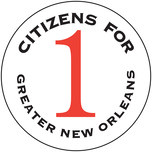Slaying Two Sacred Cows: One Group’s Part in Helping New Orleans Reform, Rebuild, and Renew4/16/2020
Ruthie Frierson, Founder & Chair Emeritus Abstract (New England Journal of Public Policy)
Many ingredients define New Orleans—certainly our music, our food, and our architecture, but most basic and defining of all is water and our relationship with it. Nestled between the Gulf of Mexico and an enormous body of brackish water, the fifty-by-thirty-mile Lake Pontchartrain, the city sits near the mouth of the Mississippi River, which drains water from 41 percent of the lower forty-eight states. We are pelted with an average sixty-five inches of rain a year; famously wet Seattle gets about half that amount. Much of our city is built on land a few feet below sea level, protected from the consequences of that location by a complex system of levees, floodwalls, pumps, and outfall canals. We all own multiple pairs of rain boots; we avoid certain intersections during thunderstorms because of the dangerously deep water that collects there. We New Orleanians know water. We also know corruption, another near-universal part of our city’s image. The fatalistic shrug with which locals receive allegations of improper dealings says, essentially, “What yah gonna do?” We laugh that, far from being the worst-governed city in the United States, we are the best-governed in the Caribbean. Roguish officials seem to have a place in many hearts. Wet and crooked, that was us. The aftermath of Hurricane Katrina was the most catastrophic man-made disaster in the nation’s history. Katrina changed everything, and every one of us. It was a shock and a wake-up call. Having obeyed Mayor Ray Nagin’s order for a mandatory evacuation of the city, our family watched from afar as New Orleans went under water. We saw images of the city’s devastation, the horror of people trapped in their houses or on rooftops waiting for rescue, of people in need of water, food, and medical attention, of deaths, of plunder and the sounds of gunfire. Eighty percent of our city was under water for more than three weeks. Our infrastructure was almost completely destroyed—our public facilities, schools, homes, businesses. More than eighteen hundred of our citizens lost their lives and thousands of others were displaced. The challenges we faced to rebuild our city were daunting and unparalleled in our history—on so many levels, and all at the same time. Yet, out of this tragedy of Katrina’s aftermath have come opportunities and a new wave of activism and involvement. Comments are closed.
|
